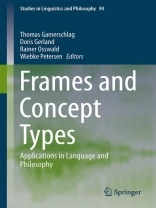This volume showcases the potential richness of frame representations. The presentation includes introductory articles on the application of frames to linguistics and philosophy of science, offering readers the tools to conduct the interdisciplinary investigation of concepts that frames allow.
* Introductory articles on the application of frames to linguistics and philosophy of science
* Frame analysis of changes in scientific concepts
* Event frames and lexical decomposition
* Properties, frame attributes and adjectives
* Frames in concept composition
* Nominal concept types and determination
‘This volume deals with frame representations and their relations to concept types in linguistics and philosophy of science. It aims at reviving concepts and frames as a common model across disciplines for representing semantic and conceptual knowledge. Departing from the general assumption that frames are not just an arbitrary format of representation but essential to human cognition, a number of case studies apply frames as an analytical tool to a wide range of phenomena, from changes in scientific concepts to particular linguistic phenomena. This provides new insights into long-standing semantic issues, such as the lexical representation of verbs (as predicative frames specifying particular event descriptions or situation types and their participants), adjectives and nominals (as concept frames, which provide attributes and properties of an entity), as well as modification, complementation, possessive constructions, compounding, nominal concept types, determination, or definiteness marking.’ Bert Gehrke, Pompeu, Fabra University, Barcelona, Spain
สารบัญ
A. Introduction to Frames and Concept Types. 1. General Introduction. 2. Evidence for Frames from Human Language. 3. From Features via Frames to Spaces: Modeling Scientific Conceptual Change without Incommensurability or Aprioricity.- B. Frame Analysis of Changes in Scientific Concepts. 4. Reconstructing Scientific Theory Change by Means of Frames. 5. Interests in Conceptual Changes: a Frame Analysis.- C. Event Frames and Lexical Decomposition. 6. Frame Net, Frame Structure, and the Syntax-Semantics Interface. 7. The Deep Lexical Semantics of Event Words.- D. Properties, Frame Attributes and Adjectives. 8. Distinguishing Properties and Relations in the Denotation of Adjectives: an Empirical Investigation. 9. Why Chocolate Eggs can Taste Old but not Oval: a Frame-Theoretic Analysis of Inferential Evidentials.- E. Frames in Concept Composition. 10. A Frame Approach to Metonymical Processes in some Common Types of German Word Formation. 11. Concept Composition in Frames – Focusing on Genitive Constructions. F. Nominal Concept Types and Determination. 12. Definitely Not Possessed? Possessive Suffixes with Definiteness Marking Function. 13. Definite Article Asymmetries and Concept Types: Semantic and Pragmatic Uniqueness. 14. The Indefiniteness of Definiteness. 15. Nominal Concept Types in German fictional Texts.












